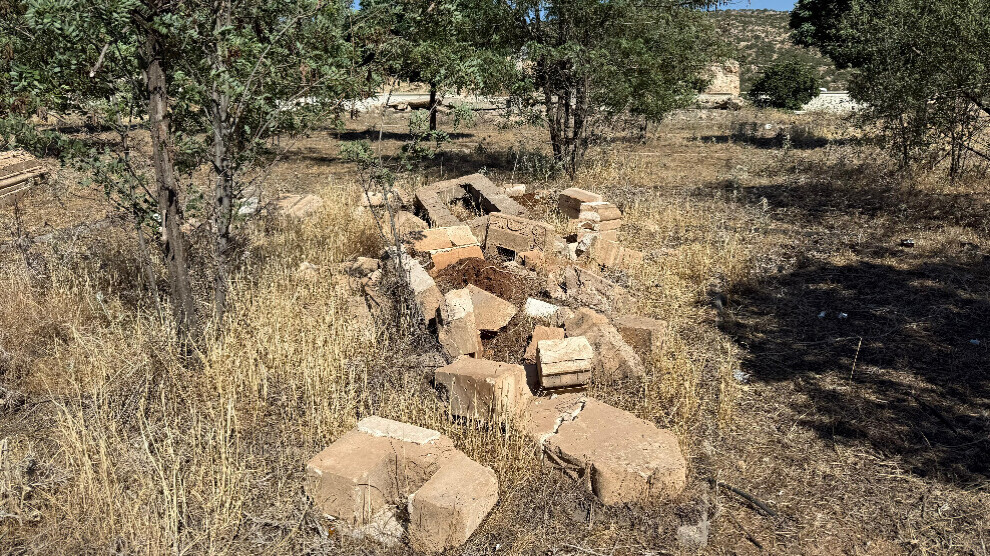Families find destroyed graves after ten-year ban on cemetery visits
Families visiting cemeteries after a ten-year ban met with destroyed graves.
Families visiting cemeteries after a ten-year ban met with destroyed graves.

Following the call made by Abdullah Öcalan on 27 February, public efforts to socialize peace have been carried out without interruption. As expectations grow about the necessary steps to be taken by the state, the people emphasize that peace cannot be one-sided and can only be built through concrete actions.
Thousands of people who have paid a heavy price, who have not yet been able to recover the bodies of their loved ones, or who continue to seek the fate of their missing relatives, are voicing their demands for peace everywhere.
Families, underlining that peace must go beyond mere discourse, once again visited cemeteries during the holiday, as they do every year. Many cemeteries which had been closed to civilians during the years of conflict, were finally opened again.
After a decade, families visiting the cemeteries were confronted with widespread destruction and devastation. The systematic attacks on cemeteries, which have become a war crime in Kurdistan, have continued almost uninterrupted since 2016.
These attacks, which became even more visible with the destruction of the Garzan Cemetery in Bitlis (Bitlis), later targeted cemeteries in Amed (Diyarbakır), Bagok, Dersim, Gimgim (Varto), and Dicle. During the conflict periods, many cemeteries where the bodies of the People's Defense Forces (HPG) guerrillas were buried were bombed, while gravestones outside the martyrdom areas were smashed and painted black.
Reacting to this ongoing destruction and looting, families visiting the cemeteries said: “They must first make peace with the dead.”
Mehmet Emin Kılıç, Amed co-chair of the Association for Solidarity with Families Who Lost Their Relatives in the Cradle of Civilizations (MEBYA-DER), stressed that peace is a great necessity for the whole society. He stated that the attacks on cemeteries are inhumane and called for all banned cemeteries to be reopened to the public.
Mehmet Emin Kılıç also emphasized that the wounds of the past can be healed through the steps that will be taken in this process.
War crimes are being committed
Mehmet Emin Kılıç described the ongoing actions as war crimes and emphasized that peace must begin in the cemeteries.
Kılıç stressed that these acts are both illegal and inhumane and said, “The state has developed specific attacks targeting cemeteries, especially in the last ten years. In many places, not a single stone is left standing; they even exhume the bodies from the graves.”
Kılıç said that they have raised this immorality and unlawfulness many times before, repeatedly bringing the issue to public attention.
Some previously banned cemeteries were opened for visits during this holiday after many years. However, Kılıç stated that the scene at the cemeteries remained unchanged and families once again encountered destruction.
Families were able to see the graves after ten years
Mehmet Emin Kılıç described the scene faced by people visiting the cemeteries as follows: “After ten years, people were finally able to see their cemeteries and ease their longing. But they could only touch broken stones and scattered soil. There are still many cemeteries that remain inaccessible and banned. In this process, peace must first begin with the dead and the cemeteries. This destruction and looting must end immediately.”
Kılıç criticized the state for not taking the necessary steps and said: “The steps taken by the state in this process are moving so slowly that families are only now able to see their cemeteries. This is not a step toward peace. The state must act according to the spirit of this process and develop policies accordingly.”
Bans on cemeteries must be lifted
Mehmet Emin Kılıç stressed that restorative and healing measures must now be taken in the face of this deep hostility. He described the destruction of cemeteries as a war crime and continued: “In response to this immoral policy, all cemeteries must be reopened to the public without delay. Despite all this destruction and these war crimes, we are still extending our hand for peace. There will never be an end to this war and destruction. A person benefits no matter where they turn back from loss. Our call at this point is clear: despite all the looting and destruction, the families are still calling for peace.”
Despite all this destruction and pain, we are still calling for peace
Kılıç stated that peace is essential to end destruction, saying, “Along with peace, we want this destruction and looting to stop.”
He continued: “Cemeteries must no longer be destroyed, and families should no longer have to pray in front of ruined graves. Families want peace and tranquility. They also want to visit the graves of their loved ones freely on every holiday and every special day. It is peace that will make this possible.”
Finally, Kılıç said: “We, the families, are still calling for peace despite all this destruction and pain, and we will continue to struggle for it at all times.”